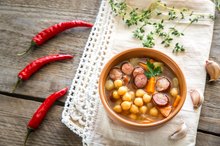What does fact checked mean?
At Healthfully, we strive to deliver objective content that is accurate and up-to-date. Our team periodically reviews articles in order to ensure content quality. The sources cited below consist of evidence from peer-reviewed journals, prominent medical organizations, academic associations, and government data.
- "Annals of Pharmacotherapy"; Effect of Soy Milk on Warfarin Efficacy; J.A. Cambria-Kiely; December 2002
- "Annals of Pharmacotherapy"; Effect of Soy Milk on Warfarin Efficacy; J.A. Cambria-Kiely; December 2002
The information contained on this site is for informational purposes only, and should not be used as a substitute for the advice of a professional health care provider. Please check with the appropriate physician regarding health questions and concerns. Although we strive to deliver accurate and up-to-date information, no guarantee to that effect is made.
The Effect of Soy Products on Warfarin Therapy
Warfarin, which is often sold under the brand name Coumadin, is an anticoagulant medication that is widely used to prevent or treat blood clots. Finding the right dose of warfarin can be difficult, and the challenge is made harder by the interaction of many foods and herbal products, including soy products. As with any health supplement, ask your doctor before consuming soy products while taking warfarin.
If you are experiencing serious medical symptoms, seek emergency treatment immediately.
Interaction
Soy products are one of the foods that may cause potentially dangerous interactions with warfarin. In at least one reported case, consuming soy milk reduced the effectiveness of warfarin, reports the New York University Langone Medical Center 2. Reducing the activity of warfarin increases the risk of blood clot formation, which can increase the risk of severe health effects such as stroke and pulmonary embolism.
Effect
Can You Eat Chocolate While Taking Coumadin?
Learn More
The effectiveness of warfarin is assessed by a measurement called the international normalized ratio, or INR. Ingesting soy milk caused reductions in INR to ineffective levels in one patient who had been receiving a stable dose of warfarin, explains an article published in the December 2002 issue of the journal "Annals of Pharmacotherapy." After the patient stopped drinking soy milk, his INR levels returned to the effective range 1.
Mechanism
Warfarin slows blood-clotting by inhibiting the action of vitamin K, a vital player in the series of biochemical reactions that result in blood clotting. Soy products contain high levels of vitamin K. Eating foods that contain high levels of vitamin K, such as soy products, can counteract the activity of warfarin, possibly necessitating an increased dose of warfarin, advises HealthFinder.gov.
Recommendations
L Arginine & Warfarin
Learn More
Although additional research is needed to confirm the effect of soy products on warfarin INR levels, you may still want to use caution with this combination. If you are taking warfarin, you do not need to completely avoid soy products or other foods high in vitamin K, you just need to make sure you consume roughly the same amount of vitamin K each day, explains the Agency for Healthcare Research and Quality 3. Avoid consuming a large amount of vitamin K-rich foods in a single sitting, or eating two vitamin K-rich foods at once.
- Although additional research is needed to confirm the effect of soy products on warfarin INR levels, you may still want to use caution with this combination.
- If you are taking warfarin, you do not need to completely avoid soy products or other foods high in vitamin K, you just need to make sure you consume roughly the same amount of vitamin K each day, explains the Agency for Healthcare Research and Quality 3.
Related Articles
References
- "Annals of Pharmacotherapy"; Effect of Soy Milk on Warfarin Efficacy; J.A. Cambria-Kiely; December 2002
- New York University Langone Medical Center: Warfarin; August 2010
- Agency for Healthcare Research and Quality: Blood Thinner Pills; August 2010
- Coumadin (warfarin sodium) [package insert]. Princeton, New Jersey: Bristol-Myers Squibb, 20XX.
- Harter K, Levine M, Henderson SO. Anticoagulation drug therapy: a review. West J Emerg Med. 2015;16(1):11-7. DOI: 10.5811/westjem.2014.12.22933
- Patel S, Patel N. Warfarin. In: StatPearls [Internet]. Treasure Island (FL): StatPearls Publishing.
- Tideman PA, Tirimacco R, St John A, Roberts GW. How to manage warfarin therapy. Aust Prescr. 2015;38(2):44-8. DOI: 10.18773/austprescr.2015.016
Writer Bio
Matthew Busse has pursued professional health and science writing since 2007, writing for national publications including "Science Magazine," "New Scientist" and "The Scientist." Busse holds a doctorate in molecular biology from the University of California-San Diego.









